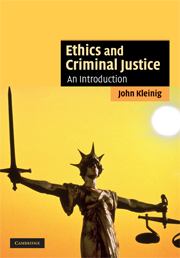Book contents
13 - The role of correctional officers
Published online by Cambridge University Press: 05 June 2012
Summary
But for the grace of God there [go I].
Although we might hope for a diminished reliance on imprisonment, we cannot expect to see prisons vanish from our social landscape. For even were we to devise alternative penalties for many of the offenses and offenders now attracting prison sentences, there would almost certainly be a group of those for whom imprisonment would remain the most appropriate penalty. And so there will need to be people to administer prisons. In this chapter we attempt to provide an account of the correctional officer's role, and to explore some of the tensions created by that role. (Our discussion of the correctional officer's role, however, will not presume the idealized scenario of a prison system that is limited only to those who are justifiably incarcerated.)
Prisons are complex institutions. They usually operate under the umbrella of a government body headed by a commissioner/director and are divided into a variety of units, some focused on the administration of the government office that oversees prisons and others directed to general areas of prison administration, such as training, human relations, internal affairs, health and other support services, finances, and physical plant and related contracting. Individual prisons have their own supervisory structure comprising a prison warden/superintendent or governor (mostly in England) and various deputies, with the extent and depth of the administrative structure of the prison usually reflecting its size in terms of both physical plant and number of inmates.
- Type
- Chapter
- Information
- Ethics and Criminal JusticeAn Introduction, pp. 233 - 251Publisher: Cambridge University PressPrint publication year: 2008



